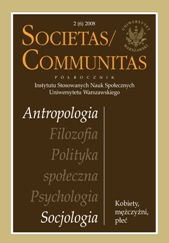Rodzynki w zakalcu, czyli o reprezentacji kobiet w reprezentacji Narodu
Raisins in the Dough. On the Representation of Women within the Representation of the People
Author(s): Jacek KurczewskiSubject(s): Social Sciences
Published by: Instytut Stosowanych Nauk Społecznych Uniwersytetu Warszawskiego
Keywords: gender; men; women
Summary/Abstract: I reflect on the theoretical dilemma related to questions of gender differentiation among the representatives of the People. This problem is marginal to the interests of contemporary sociologists, although the Parliament remains in the center of political transformation in post-Communist countries. Various aspects of representativity, especially sociographic representativity and representativity of political opinions, are confronted, on the one hand, with the ideas of mandate and "representation of the People", so deeply ingrained among the MPs, and, on the other, with the public opinion, which to a large extent grants itself the right to dismiss MPs who, in view of the represented, do not perform their representative functions properly. However, opinion supporting women's suffrage is partially independent of the opinion that women should be present in the representation. In the former case, the argument is reduced to proof that there are no essential differences between men and women which would make women ineligible to being elected; in the latter, the argument for necessary presence of women invokes the essential categorial difference between the sexes. It seems that arguments for the obligatory presence of women in the parliamentary representation should be provided by difference feminism. Since with respect to level of education - a key criterion at the time when mass democracy was born - women have caught up with, or sometimes overtaken men, employment structure and child-rearing infrastructure have evolved to such a degree that the number of financially independent women is sufficient for them to engage in the works of Parliament. Thus, the argument runs as follows: since women can directly participate in the collective shaping of the common good, there is no reason why they should be represented by proxy. In addition, since half of the People feel the need of a tangible sign of their entitlement, the other half should give way, not because of good manners, but through respect for the Ideal which is the community of free citizens, male and female. Lastly, women's taking part in the representation is not to anybody's detriment; womenengage in almost all professions and occupy all social positions, so they can represent others, including men, irrespective of their femininity. An adequate theory of representation needs to justify not the presence, but the absence, and not proportional presence, but deviating from it in favour of others.
Journal: Societas/Communitas
- Issue Year: 2008
- Issue No: 06 (2)
- Page Range: 99-124
- Page Count: 26
- Language: Polish

